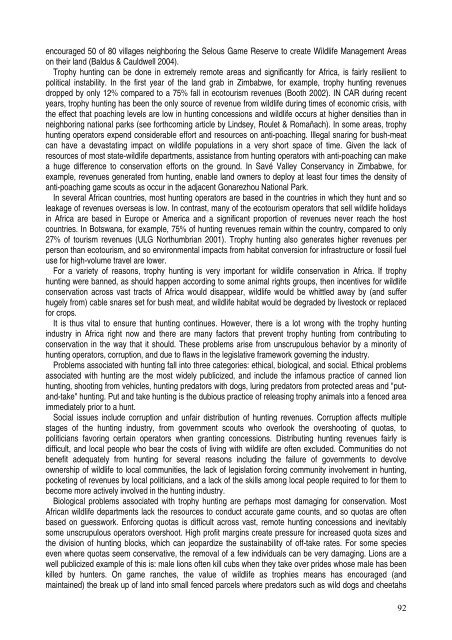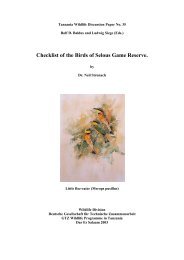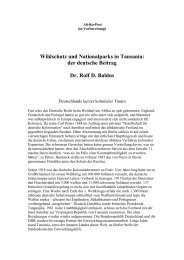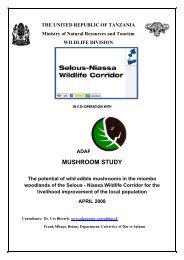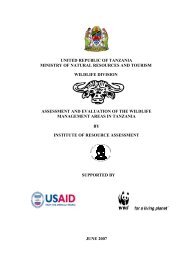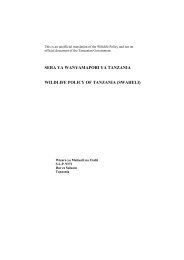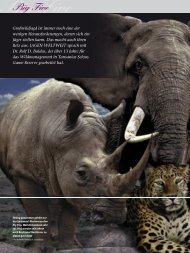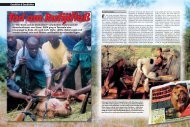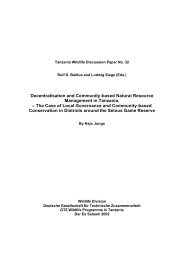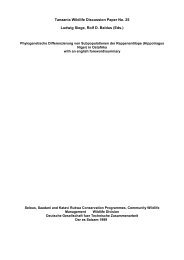African Indaba Articles - wildlife-baldus.com
African Indaba Articles - wildlife-baldus.com
African Indaba Articles - wildlife-baldus.com
Create successful ePaper yourself
Turn your PDF publications into a flip-book with our unique Google optimized e-Paper software.
encouraged 50 of 80 villages neighboring the Selous Game Reserve to create Wildlife Management Areason their land (Baldus & Cauldwell 2004).Trophy hunting can be done in extremely remote areas and significantly for Africa, is fairly resilient topolitical instability. In the first year of the land grab in Zimbabwe, for example, trophy hunting revenuesdropped by only 12% <strong>com</strong>pared to a 75% fall in ecotourism revenues (Booth 2002). IN CAR during recentyears, trophy hunting has been the only source of revenue from <strong>wildlife</strong> during times of economic crisis, withthe effect that poaching levels are low in hunting concessions and <strong>wildlife</strong> occurs at higher densities than inneighboring national parks (see forth<strong>com</strong>ing article by Lindsey, Roulet & Romañach). In some areas, trophyhunting operators expend considerable effort and resources on anti-poaching. Illegal snaring for bush-meatcan have a devastating impact on <strong>wildlife</strong> populations in a very short space of time. Given the lack ofresources of most state-<strong>wildlife</strong> departments, assistance from hunting operators with anti-poaching can makea huge difference to conservation efforts on the ground. In Savé Valley Conservancy in Zimbabwe, forexample, revenues generated from hunting, enable land owners to deploy at least four times the density ofanti-poaching game scouts as occur in the adjacent Gonarezhou National Park.In several <strong>African</strong> countries, most hunting operators are based in the countries in which they hunt and soleakage of revenues overseas is low. In contrast, many of the ecotourism operators that sell <strong>wildlife</strong> holidaysin Africa are based in Europe or America and a significant proportion of revenues never reach the hostcountries. In Botswana, for example, 75% of hunting revenues remain within the country, <strong>com</strong>pared to only27% of tourism revenues (ULG Northumbrian 2001). Trophy hunting also generates higher revenues perperson than ecotourism, and so environmental impacts from habitat conversion for infrastructure or fossil fueluse for high-volume travel are lower.For a variety of reasons, trophy hunting is very important for <strong>wildlife</strong> conservation in Africa. If trophyhunting were banned, as should happen according to some animal rights groups, then incentives for <strong>wildlife</strong>conservation across vast tracts of Africa would disappear, <strong>wildlife</strong> would be whittled away by (and sufferhugely from) cable snares set for bush meat, and <strong>wildlife</strong> habitat would be degraded by livestock or replacedfor crops.It is thus vital to ensure that hunting continues. However, there is a lot wrong with the trophy huntingindustry in Africa right now and there are many factors that prevent trophy hunting from contributing toconservation in the way that it should. These problems arise from unscrupulous behavior by a minority ofhunting operators, corruption, and due to flaws in the legislative framework governing the industry.Problems associated with hunting fall into three categories: ethical, biological, and social. Ethical problemsassociated with hunting are the most widely publicized, and include the infamous practice of canned lionhunting, shooting from vehicles, hunting predators with dogs, luring predators from protected areas and "putand-take"hunting. Put and take hunting is the dubious practice of releasing trophy animals into a fenced areaimmediately prior to a hunt.Social issues include corruption and unfair distribution of hunting revenues. Corruption affects multiplestages of the hunting industry, from government scouts who overlook the overshooting of quotas, topoliticians favoring certain operators when granting concessions. Distributing hunting revenues fairly isdifficult, and local people who bear the costs of living with <strong>wildlife</strong> are often excluded. Communities do notbenefit adequately from hunting for several reasons including the failure of governments to devolveownership of <strong>wildlife</strong> to local <strong>com</strong>munities, the lack of legislation forcing <strong>com</strong>munity involvement in hunting,pocketing of revenues by local politicians, and a lack of the skills among local people required to for them tobe<strong>com</strong>e more actively involved in the hunting industry.Biological problems associated with trophy hunting are perhaps most damaging for conservation. Most<strong>African</strong> <strong>wildlife</strong> departments lack the resources to conduct accurate game counts, and so quotas are oftenbased on guesswork. Enforcing quotas is difficult across vast, remote hunting concessions and inevitablysome unscrupulous operators overshoot. High profit margins create pressure for increased quota sizes andthe division of hunting blocks, which can jeopardize the sustainability of off-take rates. For some specieseven where quotas seem conservative, the removal of a few individuals can be very damaging. Lions are awell publicized example of this is: male lions often kill cubs when they take over prides whose male has beenkilled by hunters. On game ranches, the value of <strong>wildlife</strong> as trophies means has encouraged (andmaintained) the break up of land into small fenced parcels where predators such as wild dogs and cheetahs92


